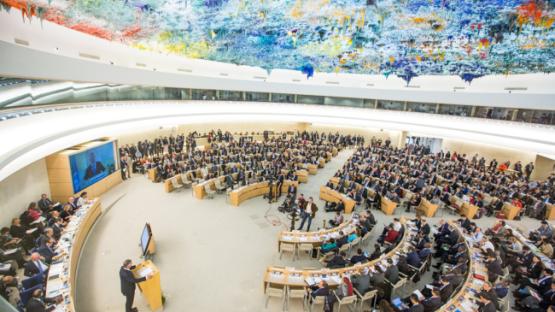Online surveillance becomes a priority for the Human Rights Council, as Pakistan joins the wrong side of the debate

Below is a joint statement from Privacy International and Bytes for All.
This Friday, 27 September, marks the conclusion of the 24th session of the UN Human Rights Council, a session which has, for the first time, seen issues of internet surveillance in the spotlight. Privacy International and Bytes for All welcome the attention given at the Human Rights Council to this issue. However, we are concerned about developments which took place that threaten privacy rights and freedom of expression, especially because these alarming suggestions are masked as solutions to address the increase in State surveillance.
We agree with the High Commissioner for Human Rights, Navi Pillay, who urged States “to ensure that adequate safeguards are in place against security agency overreach and to protect the right to privacy and other human rights.” State surveillance severely threatens individuals’ rights to privacy, free expression and free association; impedes an open and democratic society; hinders a free press; breeds conformity and undermines innovation; and strikes at the heart of human dignity and autonomy. It must only be conducted in the most exceptional circumstances, under the watchful eye of an independent judicial authority and strong oversight mechanisms.
However, it appears as if the issue of State surveillance is being high-jacked by a collection of countries in order to push their own agenda to exert greater control over the internet within their own countries.
Pakistan, on behalf of Cuba, Venezuela, Zimbabwe, Uganda, Ecuador, Russia, Indonesia, Bolivia, Iran, and China, made a joint statement before the Council to emphasise the need to protect the rights to privacy in view of technical advancements which are permitting States to carryout mass surveillance. However, the coalition used the opportunity to call for a “strategic rethinking of the global internet governance mechanism”, noting that “the internet is too big, too international and too much of a household thing to be left operating by a few who have misused it without any international legislation and monitoring of these abuses.”
Privacy International and Bytes for All reject this call for more regulation of the internet, which should remain free, independent and open for all to use. The statement is a transparent attempt by these countries to limit the flow and exchange of information, thus putting at risk other rights, including the right to privacy and freedom of expression.
These two rights are intrinsically linked, as laid out in a recent UN report by the Special Rapporteur on the promotion and protection of the right to freedom of opinion and expression, Frank La Rue. While addressing State surveillance is essential to ensuring the protection of human rights, the solution is not to develop new rules and restrictions that will increase State control of the internet. Any regulations that violate freedom of expression imperil privacy rights, and vice-versa. We condemn any attempts by these states to usurp this important debate to push their own agenda of oppression.
Pakistan has a deplorable track record on internet issues, as it continues to carry out widespread mass surveillance, filtering and censorship of cyberspace. In recent months, researchers have found active presence of Netsweeper, an internet firewall that resulted in a mass URL filtration in Pakistani cyberspace with dire consequences for many rights including freedom of expression. It has been over a year since YouTube was banned and more recently a secret censorship arrangement was also exposed between Facebook and the Government of Pakistan . The command and control servers for the digital surveillance technology FinFisher have been also found in Pakistan.
The deployment of mass surveillance is being imposed on citizens at a time when the country needs all its resources directed towards socio-economic wellbeing of its people. Privacy International and Bytes for All are concerned about blatant violation of privacy rights by the authorities, especially in the absence of individual protections or any remedial mechanisms in the country. At a time, when Pakistan still has to implement its commitments as agreed at the Universal Periodic Review in year 2012, its continuing hostile and draconian policy regime towards online freedoms at national and global level is alarming.
With this in mind, we are urging States to reiterate their commitment to existing human rights standards and mainstream protection and oversight mechanisms into their data protection and internet governance policies and practices. Current international and regional human rights frameworks already provide the necessary foundation to protect the right to privacy. The crux of the problem is not the lack of human rights standards, but failure to update and enforce existing laws and to provide strong oversight mechanisms to monitor their use. We call on States to ensure the application of existing human rights standards as laid out by the 13 Principles, which were launched during this session.